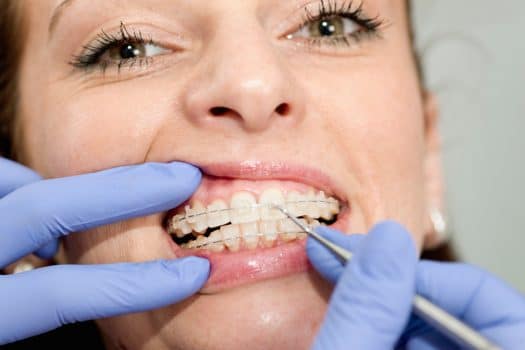After the orthodontist puts your braces on, he will have you come back for regular appointments to make adjustments. These adjustment appointments are an extremely important part of your orthodontic care—and a very necessary one if you want to correct your smile properly and in a short amount of time.
Why Adjustments?
During the cell regeneration process, changes in tooth movement require at least three weeks to take effect. The force on your teeth and movement of them causes some cells (bone, tissue) to break down and new cells to regrow. After the regeneration happens, the teeth and supporting structures begin loosening and moving again.
The pressure that the braces place on your teeth to cause movement will reduce over time, making it necessary that the orthodontist re-establish the force needed to straighten your teeth. The orthodontist needs to adjust brackets, replace rubber bands and make small bends in the wires.
Without adjustments, your teeth will stop moving and treatment will not progress. Missing your regularly scheduled appointments is a surefire way to prolong your experience in braces.
Depending on your treatment plan, the orthodontist may ask you to return every three weeks, or he may decide on any time range up to about two months. Four to six weeks is the most common interval for orthodontic adjustments.
What to Expect
Your regular appointments allow the orthodontist to take a closer look at the tooth movement and determine whether the prescribed treatment plan is still the best one. The average patient will spend one to three years in braces, and changes can occur during that time.
A normal adjustment appointment will last about 30 minutes and may include:
- Replacing the rubber ties that hold the wire into the braces
- Removing the wires
- Allowing the patient to brush and floss
- Checking on progress and recommending treatment (i.e. new wires, elastics, rubber bands, etc.)
- Placing new colored rubber bands onto the braces
Depending on your progress, the orthodontist may need to replace the archwire as well. Make sure to tell him if the archwire is poking your mouth, because he will have tools needed to clip it. Sometimes the archwire will not bother you immediately, but you will notice it poking you after a day or two. This is good because it means your teeth have shifted, but you will need to return to the office to have the excess cut.
Typically, you will experience some discomfort following an adjustment appointment. This might include some discomfort and tightness in your mouth, beginning a few hours after your adjustment and lasting about three to five days.
You will likely want to go on a soft-food diet for a few days after each of your appointments. It’s a good excuse to try some new recipes! Taking over-the-counter pain relievers (like ibuprofen) can also help ease any discomfort. Typically, the level of discomfort will decrease as you undergo more adjustments.
Visiting your orthodontist regularly will also allow you to become more engaged in the process. Get a list of any questions you might have together and have them ready to go. Write all of your questions down and take them to your appointment so that you don’t forget.
In between appointments, your orthodontist will give you specific instructions for caring for your teeth. It is important to follow these instructions exactly as directed. Poor oral hygiene while wearing braces can extend your treatment time, as well as stain or damage your teeth.
At Orthodontic Associates, we are committed to accurately assessing every patient’s need to treat it most effectively in the shortest period of time. Contact us at any of our nine convenient locations around Baltimore for your initial consultation, and see how we can help you with your healthy bite and winning smile.



